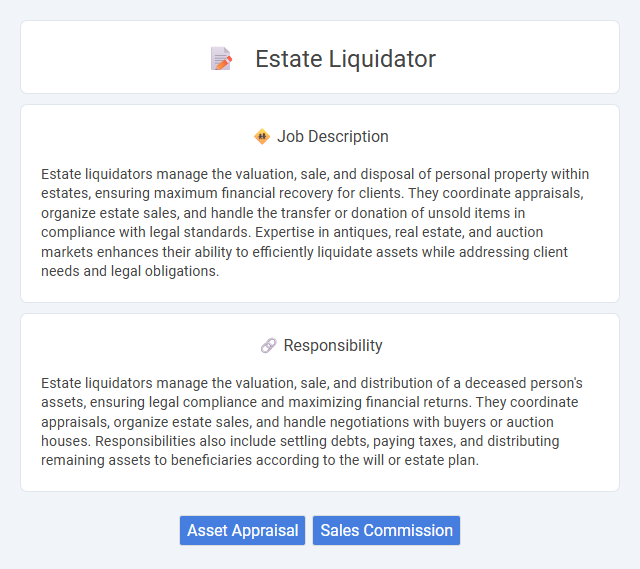
Estate liquidators manage the valuation, sale, and disposal of personal property within estates, ensuring maximum financial recovery for clients. They coordinate appraisals, organize estate sales, and handle the transfer or donation of unsold items in compliance with legal standards. Expertise in antiques, real estate, and auction markets enhances their ability to efficiently liquidate assets while addressing client needs and legal obligations.
Individuals who are detail-oriented and possess strong organizational skills are more likely to succeed as estate liquidators, given the job's need for managing diverse assets and sensitive situations. People comfortable with negotiating sales, handling emotionally charged environments, and performing appraisals may find this role suitable. Those who prefer stable routines or avoid interpersonal challenges might be less inclined to thrive in estate liquidation work.
Qualification
Estate liquidators require strong organizational and negotiation skills to efficiently appraise, manage, and sell assets. Professional qualifications often include certification from recognized bodies such as the Accredited Estate Liquidator (AEL) or equivalent credentials in appraisal and liquidation management. Experience in inventory management, legal knowledge of estate laws, and proficiency in creating detailed sale strategies are essential to maximize asset value for clients.
Responsibility
Estate liquidators manage the valuation, sale, and distribution of a deceased person's assets, ensuring legal compliance and maximizing financial returns. They coordinate appraisals, organize estate sales, and handle negotiations with buyers or auction houses. Responsibilities also include settling debts, paying taxes, and distributing remaining assets to beneficiaries according to the will or estate plan.
Benefit
Estate liquidators probably offer significant benefits by efficiently managing and selling assets, which can save time and reduce stress for clients. Their expertise likely helps maximize returns from property sales, potentially increasing overall estate value. Hiring a professional could also minimize legal complications and ensure a smoother transition during estate settlements.
Challenge
Estate liquidator roles likely involve navigating complex emotional and logistical challenges, as they must efficiently manage the sale or disposal of personal belongings while respecting the sentiments of heirs. The probability of encountering unexpected legal or valuation issues is high, requiring adaptability and expertise in appraisal and negotiation. Professionals in this field may frequently face time-sensitive deadlines that add pressure to the already demanding nature of the job.
Career Advancement
Estate liquidators specialize in managing and selling assets from estates, providing expertise in valuation, organization, and liquidation processes. Career advancement in this field often involves gaining certifications such as Certified Estate Specialist (CES) and expanding skills in appraisals, negotiation, and legal compliance to qualify for managerial or consultancy roles. Networking with real estate professionals, auction houses, and legal experts can open opportunities for leadership positions or establishing an independent estate liquidation business.
Key Terms
Asset Appraisal
Estate liquidators specialize in conducting precise asset appraisals to determine the value of personal property, real estate, antiques, and collectibles within an estate. They utilize market analysis, historical sales data, and expert knowledge to ensure accurate valuations that maximize estate liquidation proceeds. Accurate asset appraisal is essential for fair distribution among heirs, tax reporting, and efficient liquidation processes.
Sales Commission
Estate liquidators specialize in selling personal property and real estate from estates, earning a sales commission based on the total revenue generated from the liquidation process. Commission rates typically range from 20% to 50%, varying by market and the complexity of the items involved. High-value estates with antiques, collectibles, or real estate holdings often yield higher commissions due to the increased sale prices.
 kuljobs.com
kuljobs.com